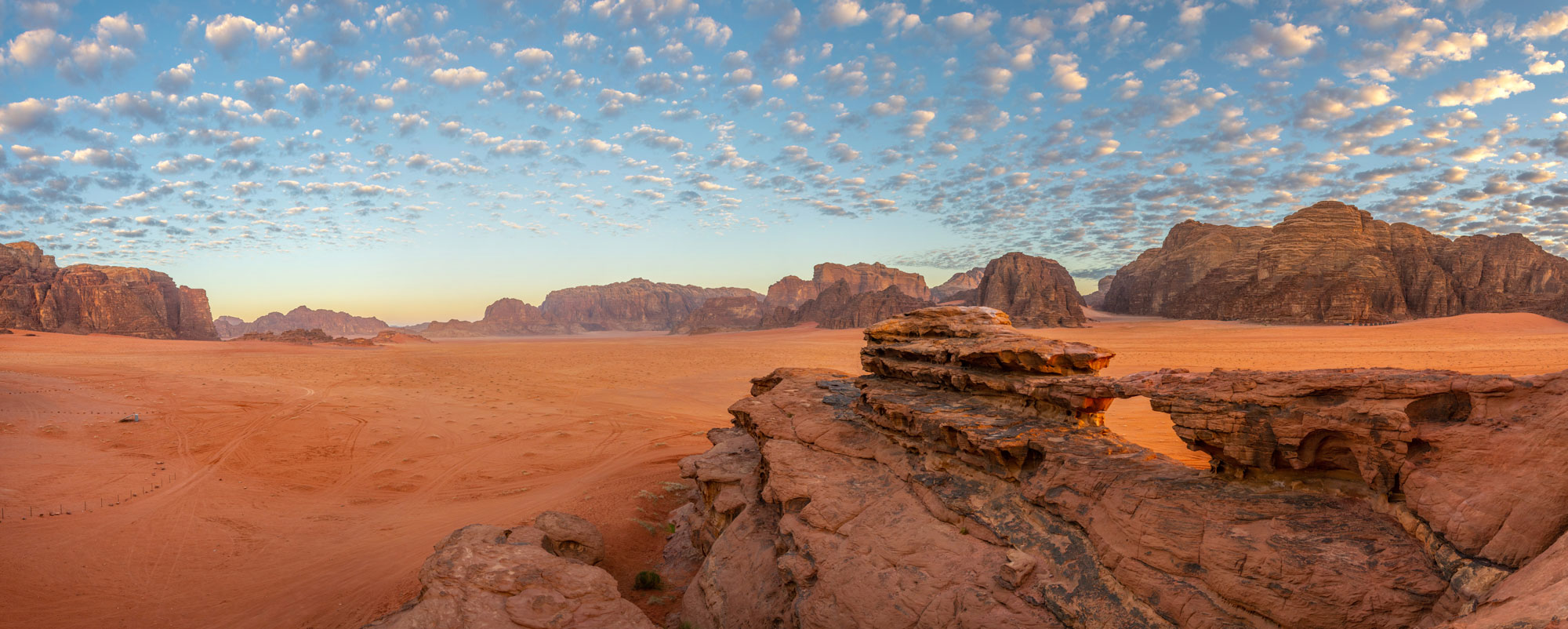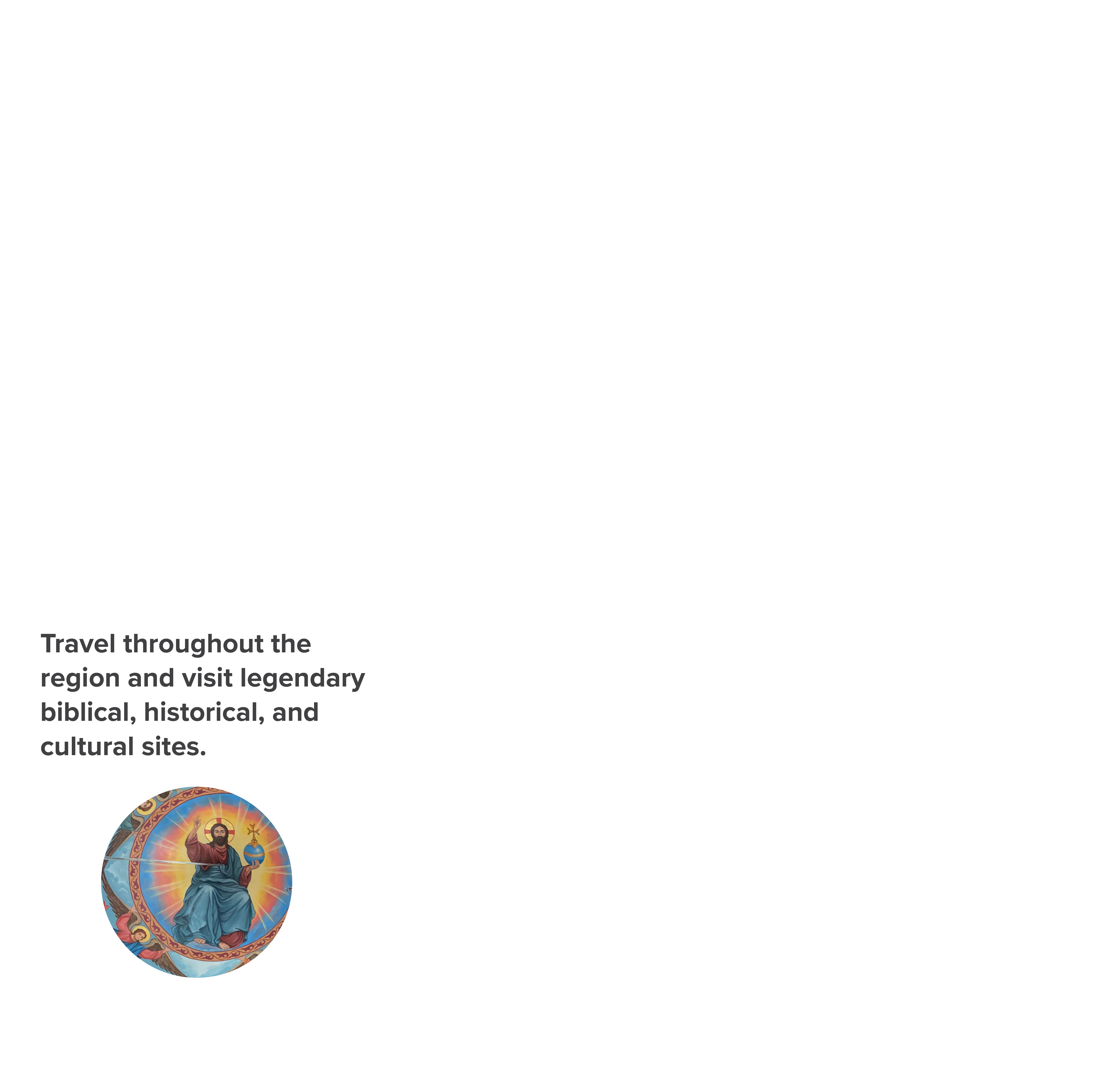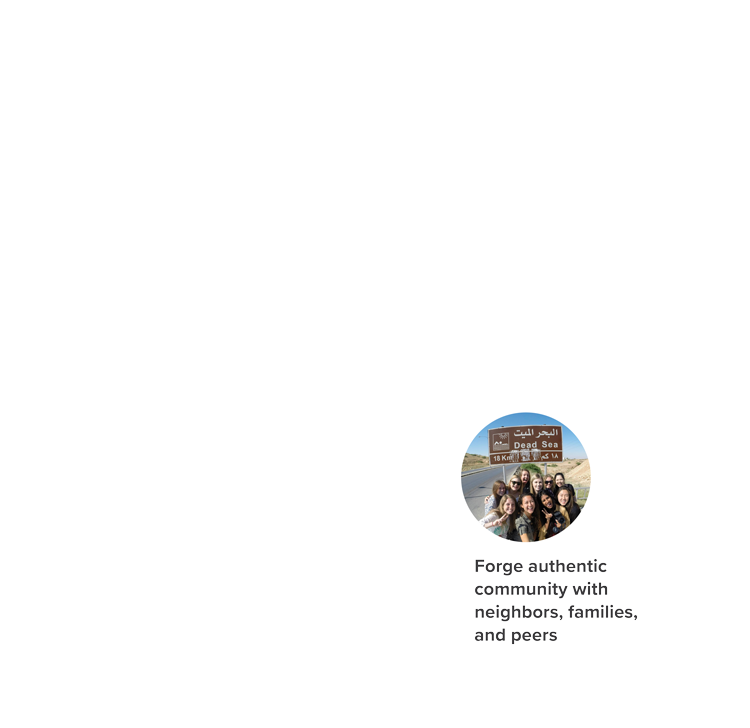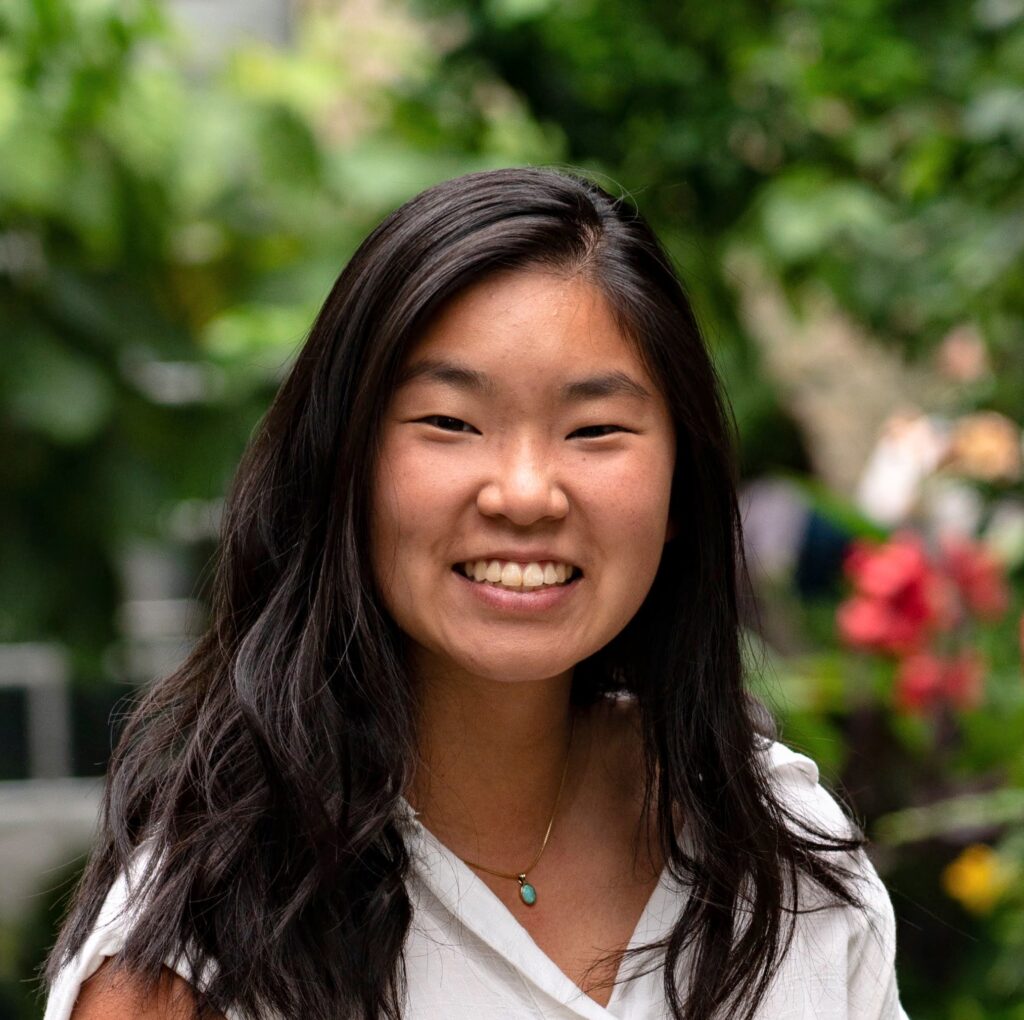Located in Amman, Jordan, the Middle East Studies Program (MESP) gives students the opportunity to experience the daily life, language, food, culture, religion and politics of a city with ancient roots and modern significance. With travel throughout Jordan, and to other locations in the Middle East, you will learn firsthand from local people how to work, play and serve in the region, as you grow in how to be a neighbor and embrace difference.
Connect With MESP
With 30 years of encouraging active Christian engagement in the Middle East since 1993, the Council for Christian Colleges and Universities (CCCU and which oversees the operations of CCCU GlobalEd programs such as MESP) will no longer be operating the Middle East Studies Program after the spring 2024 semester. Students are encouraged to apply and attend the program for the spring 2024 semester.
The changing nature of global higher education has impacted the Middle East Studies Program. In today’s academic climate, campuses are better equipped to assist and prepare students for new realities and expanded their own off-campus programs to meet the needs of current and future generations.
The MESP program has faithfully educated over 1,100 students in Egypt, Jerusalem, and Amman, Jordan. The CCCU extends our deep gratitude to all who have made this program successful, especially to the staff members who faithfully taught, mentored and guided our students while offering them new cultural opportunities. There are thirty years of stories revealing the value of this program for individual students and campuses. The stories of MESP alumni whose experiences instilled a commitment to lifelong cultural engagement will continue to be shared and celebrated.
The ability and opportunity to attend the Middle East Studies Program as it is currently constructed is still available for the Spring 2024 semester, and students are encouraged to apply and spend a meaningful opportunity on this program!
If a student has any questions regarding admissions and attending MESP, please email the CCCU GlobalEd Office at globaled@cccu.org.
A full statement on this decision can be found on the CCCU website here.
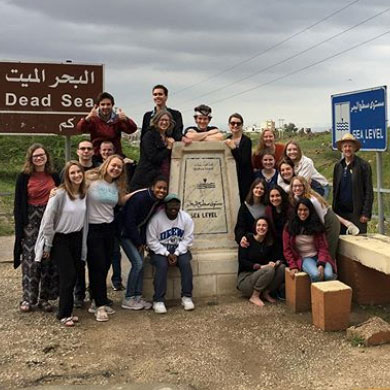
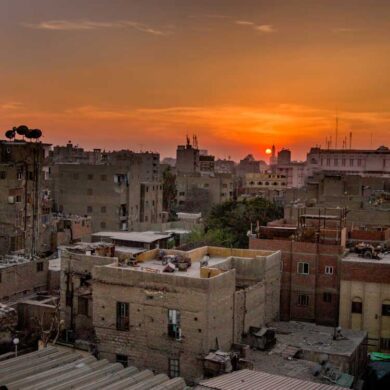
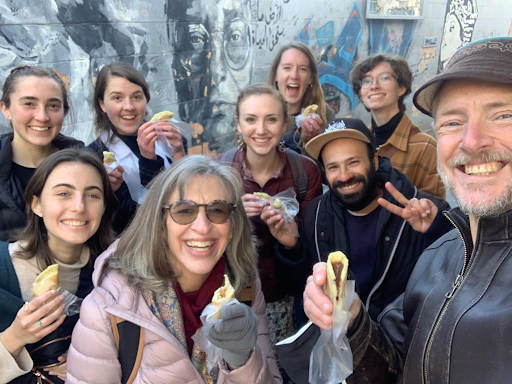
Dear Prospective MESPer,
I am so glad that you are considering the Middle East Studies Program! My wife, Patti, and I have spent the past four decades living in Arab contexts, and we consider it a privilege to introduce our students to the region we have come to love and call home.
A semester with us in the Middle East offers some amazing opportunities:
- Develop skills and confidence that will enable you to step out of your comfort zone and enter into the life contexts of people who are different from you to learn and relate and adapt. (Our students show significant intercultural growth each semester, as measured by a leading tool, the Intercultural Development Inventory.)
- Come to a deeper understanding of Islam through hearing from and interacting with Muslims. Become the kind of person who can build relationships and bridges, who can help Christians and Muslims (and anyone else) learn to live together well in the spaces we share in today’s increasingly globalized world.
- Gain insight into the complexities of the Israeli-Palestinian conflict and grow in your understanding of what it means to be a peacemaker, as you are exposed to people and perspectives on both sides.
- Learn Arabic (the Jordanian dialect) in a way that is both fun and practical! You’ll have daily opportunities to use what you learn as you take taxis, interact in shops and restaurants, and travel to other areas in the Middle East. Many MESP students develop a “bug” for Arabic that leads to further study.
- Experience deep and life-changing community with your MESP cohort, and build lifelong friendships with students from different universities and backgrounds. You will live, study, and travel with a group of 12-20 students and staff for the duration of your MESP experience.
- Take two trips in the region (one to Israel-Palestine, and another to places that have included Egypt, Tunisia, Morocco, and Turkey), during which you will meet local people, hear from speakers on various topics, marvel at historic and cultural sites, and taste the food specific to each place.
- Spend one day per week in a service project, in which you learn as you make yourself available to serve. Opportunities include working with refugees, women’s projects, schools, and more.
- Consider how faith impacts all of the above, as you engage with the people and issues of this region.
Many of our alumni return to the Middle East pursuing careers in humanitarian work, foreign service, and ministry. Others apply what they learned during MESP to various vocations in the States and Canada. Whatever your career interests, the skills and perspectives you gain on MESP will help you be the kind of person who is ready to adapt to new and challenging situations, relate positively to others, and successfully negotiate diversity (skills that are in demand in all workplaces in our pluralistic world).
We hope to see you in Amman!

Doug Magnuson
Director
Are you ready to dive in and learn adventurously? As a MESP student, you will have daily opportunities to get out of the classroom and learn through experience. Not only will you hear from local experts on local and regional issues, you will also live, serve, eat, play and travel among Jordanians & other peoples of the region, experiencing life in their neighborhoods and life contexts and hearing their perspectives and stories. In accordance with our Christ-centered approach, through our courses we seek to listen, learn, and grow in what it means to love our neighbors.
Recommended Credits
| Courses | Credits |
|---|---|
| 4 – 6* | |
| 4 | |
| 4 | |
| 4 | |
| Total Credits | 16 – 18 |
*Students who elect to take 6 credits of Introduction to Arabic Language will be charged an extra $500
Intercultural Development
When Dr. Doug lectures, you’ll want to listen up! His specialty is intercultural development — teaching students to grow in how they relate to and live effectively among people from different cultures. His passion is to see students truly understand what it means to engage in another culture, to live as pilgrims rather than tourists. As part of the Peoples and Cultures course, you will take the Intercultural Development Inventory and be personally mentored by Dr. Doug and Program Administrator Patti Magnuson on how to relate to local people, communicate effectively, and grow in your understanding of culture as a whole. You will also be challenged to apply these principles of understanding and openness to your other courses.
In addition to the interactions you’ll naturally have while living immersed in this culture, MESP provides opportunities for you to make progress in these areas by facilitating service projects, homestays, and multiple cultural exchanges in which we pair you up with local young adults who speak English and are interested in sharing their culture with you.
MESP Director Dr. Doug Magnuson coordinates the four classes you’ll take here. He has lived in the Middle East for the past four decades and will give key lectures based on his unique experience and expertise. However, most of your class sessions will be taught by local guest lecturers (see below). Plus, MESP students take all their classes together, which means you’ll be able to discuss the morning’s lecture over lunch, the afternoon field trip, or while hanging out in your apartment.
“As-Salamu Alaykum.”
All day, each day, Muslims share this greeting. It’s a greeting related to “Shalom Aleychem,” the salutation used by Jews for centuries. Both mean, “Peace be upon you.” But few regions in the world seem further from peace than the Middle East.
It is for this reason that we recall the words of Jesus, “Blessed are the peacemakers,” knowing that if we are to be true peacemakers, we must first understand the complex causes of conflict. One of the first lessons here is that peace comes only through sacrifice and engagement – not mere words or cheap grace.
The Middle East Studies Program integrates the study of culture, history, religion, politics, and language. Three seminar courses and an Arabic course overlap and interact throughout the semester. In addition, qualified students may receive intercultural practicum credit during the semester (please contact the DC office if interested in learning more)
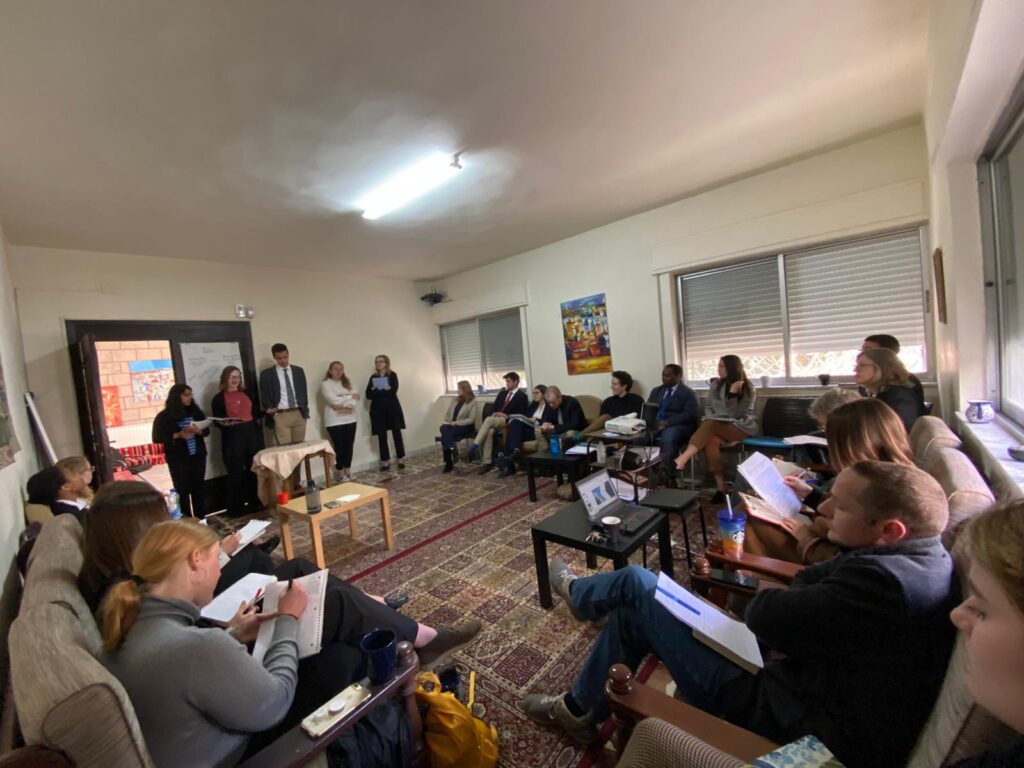 Cohort Model
Cohort Model
MESP operates on a cohort model, which means that students take all their classes together. In addition, you will live, worship, eat, and spend three weeks traveling with your fellow MESP students. Staff members are also with you every step of the way.
Doing all of these things together allows you to get the most out of your academic experience in the Middle East. You’ll have the opportunity to process what you’re learning with staff members, fellow students, and even guest lecturers, who sometimes join us for lunch. In addition, as a Christ-centered program, we seek to reflect daily on how Jesus would have us engage with the people and issues we’re studying. It’s an academic and spiritual journey as a community!
Guest Speakers
MESP is non-partisan and we believe you should be exposed to all sides of the issues we’re studying: on a regular basis throughout the semester, MESP hosts guest speakers from across the spectrum to teach about the culture, religion, and politics of the region. We want you to understand complex issues from various perspectives and decide for yourself where you stand.
To make sure we engage with students’ particular areas of interest, our speakers also examine specialized areas of the subjects we study, such as psychology, history, politics, international relations, intercultural studies, anthropology, journalism, communications, gender studies, religion, and reconciliation or peace and conflict studies. We are privileged to have a great network of amazing speakers, in Jordan and in the places we travel to. Our speakers include widely published journalists, heads of academic programs, leaders for peace and reconciliation, tribal leaders, university professors, experts in local history and culture, business innovators, interfaith experts, social researchers, religious leaders, aid and development workers, and more.
Program Components
At MESP we believe that listening to lectures and reading textbooks are only a portion of the study abroad experience. So we’ve designed several additional program components to help you get the most out of living in the Middle East. These components are designed to complement your classroom learning and assist with your intercultural development.
Orientation and Re-Entry
Service Projects
Site Visits
The travel component is one of the most exciting parts of MESP. Students travel to many of the region’s legendary historic, religious, and cultural sites, hearing from experts in each area while also experiencing the hospitality of our friends in these diverse cities and countries.The best part: all of your expenses for the travel component (aside from souvenirs purchased on the trip) are covered by your MESP tuition!
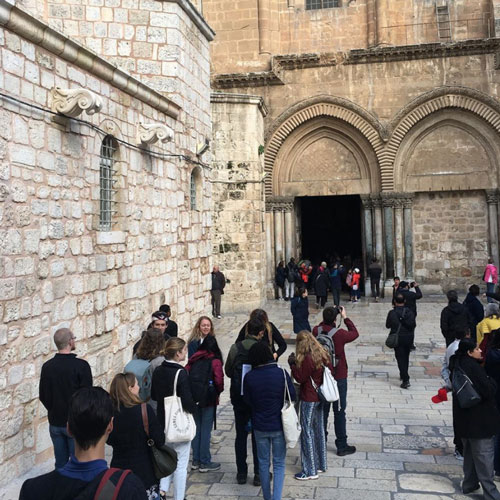
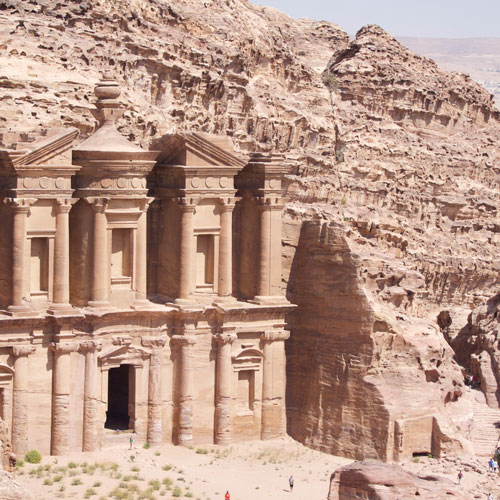
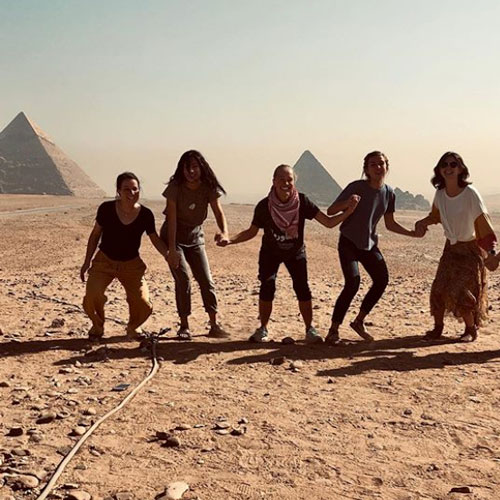
Traveling as a learner is different than traveling as a tourist. Before landing in each country, you’ll receive background information so you can enter the context with a better grasp of the local history, culture and current issues. Once you’re on the ground, local guides, lecturers and cultural exchange opportunities will help you go deeper in your understanding. You’ll have opportunities to try the local food and drink (fresh mango juice in Cairo, for example, or nusnus coffee in Morocco), and to have unique cultural experiences like visiting a local hammam (traditional Turkish bath). We also make sure there’s free time in each locale for you to wander and explore, chat with people you meet, and explore the coffee shops, squares, markets and museums.”
Jordan is a country with a great diversity of places to visit and things to see, and our location in Amman gives us easy access to all the sites. You’ll have the option to travel on MESP-organized trips to the world wonder of Petra, the breathtaking desert of Wadi Rum (made famous in the film Lawrence of Arabia — and more recently The Martian, Star Wars IX, and Dune), and the coral reef of Aqaba for snorkeling. We’ll also visit archaeological sites, such as Jerash and Ajloun castle, and Biblical sites, including Mt. Nebo and the site of Jesus’ baptism.
Each semester typically includes two trips, one to Israel-Palestine, and another (conditions permitting) to one or two of the following countries : Egypt, Turkey, Morocco and Tunisia. In Cairo, Egypt, we’ll marvel at the Pyramids of Giza — the only remaining of the ancient wonders of the world. We’ll have tours of Coptic Cairo and Islamic Cairo, visit The Egyptian Museum, and sail a felucca on the Nile. In Morocco, we’ll visit one of the world’s oldest universities in Fes, and the exquisite Hassan II mosque in Casablanca. We’ll wander the plaza of Jemaa El Fna in Marrakech by night and the labyrinth of Old Fes by day, where you can witness leather being made in the world’s oldest tannery. In Istanbul, Turkey, we’ll take in the centuries of history in this city that bridges Europe and Asia. We’ll visit the Hagia Sofia, explore the labyrinthine Grand Bazaar, and marvel at the blue Iznik tiles of the Rustem Pasha mosque; take a boat ride on the Bosphorus; and enjoy a classic Turkish breakfast. In Tunisia, we’ll wander the streets of the old medina, explore the ruins of ancient Carthage, see the extensive Roman mosaic collection at the Bardo museum, and visit places like the pottery center of Nabeul (located on the shores of the Mediterranean) and the religious hub of Kairouan. In Israel-Palestine, we’ll visit sites in Jerusalem and Bethlehem, such as the Church of the Holy Sepulchre, the Garden of Gethsemane, the Mount of Olives, Shepherd’s Field and the Church of the Nativity. In all our travel, our purpose is to engage the local context and people, to better understand each place and the region as a whole.
On MESP you won’t be a tourist; you’ll be a pilgrim. Along with visiting sites of historical, religious, and cultural significance, students will spend time exploring local coffee shops, parks and markets. Life in Amman is full of relational opportunities, like playing soccer with neighborhood children, trying a new restaurant with Jordanian peers, and entering into Arab customs and traditions. Who knows, maybe you will even be invited to an Arab wedding!
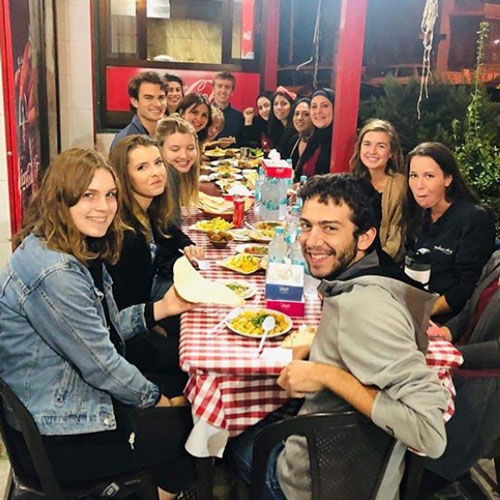
The Neighborhood
You will be living in a furnished apartment in the western part of Amman, a city that is both contemporary and also traditionally Arab. Amman is a bustling hub of activity attracting visitors from surrounding Arab countries. You’ll find plenty of coffee shops and great local food — have you heard of shawarma, falafel, and mansaf? — just around the corner. Plus, you won’t be far from Amman’s Old City, known as “the balad,” which is a great place for eating, shopping, mingling with Jordanians, and practicing your Arabic.
Living in a Jordanian context will give you an opportunity to apply the intercultural skills you’re developing in class as you adapt to traditions different from your own. You’ll learn how to greet your neighbors properly, experience the importance of family in this culture, hear the Muslim call to prayer, and maybe even see a herd of sheep and goats wandering through your neighborhood.
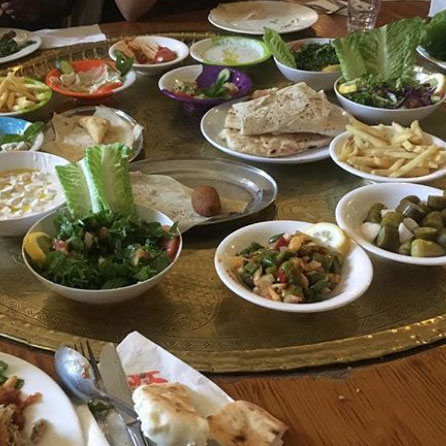
The Community
As a MESP student you’ll have the privilege of participating in an intentional community — something we all work together to create. MESP students see each other everyday: you live, eat, attend class, reflect and worship, and travel together. MESP cohorts are always a mixture of right and left, both religiously and politically, and we strive to foster a community of respect, where each voice can be heard and where the beliefs and thoughts of one can sharpen the whole group. Every day we seek to love, support, and challenge each other as outlined in a community covenant we each agree to at the beginning of the semester.
Jesus is also a central member of our community, and we seek to integrate Him into our daily lives — to turn to His ways of reconciliation when problems arise, to stand by His principles of seeking unity and love, and to serve each other as He exemplified. In an intentional effort to focus on Jesus, we hold student-led devotions together three times a week. Plus, we keep Fridays and Sunday mornings free so you have the opportunity to participate in local worship services.
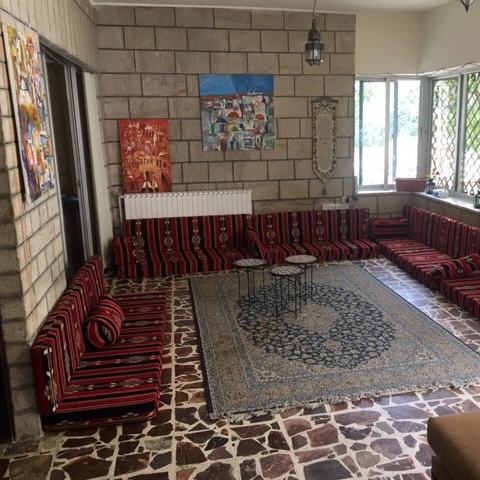
Housing
Living: MESP students live in the same family apartment complex as the MESP staff. Our building is located in a quiet residential neighborhood within easy walking distance of stores, restaurants, coffee shops, banks, transportation, parks, and more. All of the apartments are fully furnished and have washing machines, dishwashers, and wireless internet. All female students share one large apartment, and male students share a second apartment adjacent to the MESP Center. Bedrooms are always shared (2-4 people/room), and occupancy varies depending on the size of each semester’s cohort. The MESP Center, located on the first floor, includes a classroom, shared living room spaces, a game room (with ping pong table), and (outside) the beautiful MESP garden!
Studying: While you can always study in your apartment, you’ll also have the opportunity to venture out into the city and discover your own favorite homework spot in one of the city’s hundreds of coffee shops (there are several in the immediate neighborhood). And, who knows, you might just find that the ruins of the Citadel are the best place to get some reading done!
Relaxing: When you’re not hanging out with your roommates in your apartment, Amman offers a wide range of places to relax. Depending on what you like to do, you will find parks where you can walk, jog, or just sit on the grass and talk with a friend; bowling alleys, movie theaters, and malls; and of course that classic Middle Eastern place to relax — the coffee shop!
Activities: Like many bustling cities, Amman offers countless opportunities to fill your weekends and free time. Live music, street art tours, art museums, and book festivals are just a few of the cultural options available in Amman. If sports are more your style, you’ll find pickup groups that play Ultimate Frisbee, volleyball, soccer, and more. If the thrift store hunt exhilarates you, you’ll love Souk Jomaa (Friday Market) with its rows and rows of affordable used clothes and shoes. And Sports City, walking distance from the MESP apartments, offers picnicking spots, running routes, and lots of green space in the midst of Amman’s urban landscape.
Transportation
Public transportation is readily available in Amman. Taxis and Ubers are a common and affordable way of getting around West Amman. If you want to save more money, there’s also a shared taxi system and a bus system that we’ll help you learn how to use. And MESP students often don their walking shoes and choose to travel to closer spots by foot, diving into another opportunity to explore the city and meet Jordanians on the way. Though this may all sound a bit overwhelming now, rest assured, after a short while you’ll be finding your way around like a pro!
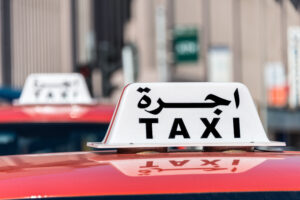
Weather
The summer months (May – Oct) can be particularly hot with little precipitation. The weather gets gradually cooler (and possibly rainier) throughout the fall semester. The spring semester starts in the middle of Jordan’s winter — which can get surprisingly cold! Though it won’t be cold for too long (outside, at least), the homes don’t have central heating, so plan to dress in lots of layers during the spring semester. The weather will gradually warm up and you’ll get to experience the beautiful almond and olive trees in full bloom. Prior to packing, we recommend looking up specific temperature and rainfall averages.
Student Stories
True Middle Eastern Hospitality
That night, in a village in Irbid, Jordan, I had the privilege of witnessing traditional Jordanian hospitality first-hand at the house of Abou Nidal, a respected leader in his tribe. For dinner, Abou Nidal’s family members served us ginormous—and I mean GINORMOUS—plates of mansaf, the national dish of Jordan. We were taught how to lump chunks of lamb, yogurt, and rice into little balls—balls I was meant to mould with a mere three fingers and flick into my mouth. I can’t say I was extremely successful at my attempts, but it was definitely an experience!
After being absolutely stuffed from dinner, our hosts still offered us cups of hot coffee and tea, which we readily accepted on that cool spring night. Now seated around a campfire, Abou Nidal proceeded to tell us an animated, entertaining story about how he met his wife. A time of show-and-tell followed, and I sipped on my cup of tea as I listened to his children and grandchildren sing us melodious Arabic songs. We also chimed in with a hymn or two of our own.
It felt surreal. How beautiful to witness traditional Jordanian culture in such a context, where guests were treated with honor and family members of all ages interacted with each other on such an intimate level. Although I was in a brand new environment, although I was among people I hadn’t known for very long, I felt welcomed. I felt at ease. That night in Irbid is and always will be one of my most cherished memories of the Middle East.
– Eliza Tan, Asbury University, MESP Spring 2018
The Middle East Studies Program is an interdisciplinary program that gives no preference to students in any particular field of study. However, a good academic record is necessary: students are required to maintain a GPA of at least 2.75 on a 4.0 scale, regardless of major.
MESP is designed for students in their second, third, or fourth year in college. All full-time students earning credit toward their degree are eligible.
HOW DO I APPLY?
Simply complete an online application for the semester during which you plan to participate. Each campus makes its own policies regarding off-campus study, so you should consult your academic dean, off-campus study coordinator, and/or advising faculty member at your school to ensure completion of all campus requirements.
If you have any questions about the admissions process, please fill out the Contact Us form at the bottom of the page.
Before your application can be reviewed for admission, you must submit all of the following materials:
- A completed online application form
- $50 application fee (payable by check or credit card)
- One faculty reference
- One character reference
- Official transcript(s) of all college course work
- Certification Form
YAY! MY APPLICATION WAS ACCEPTED! NOW WHAT?
Once admitted into the program, you will be required to confirm your intent to participate by submitting a non-refundable $300 confirmation fee, which will be applied toward your program tuition.
You will also be required to complete additional confirmation and pre-departure materials, including but not limited to: waiver and liability forms, a medical information form, a housing form, and proof of international medical insurance. But don’t worry! We will send you all of the details and instructions upon acceptance.
SEMESTER PROGRAM DATES
Spring 2024
Rolling Admissions
| Application available until (or spots are filled) | Nov 15 |
| MESP begins on arrival | Jan 4 |
| MESP concludes | Apr 13 |
*Please note, that the spring 2024 semester is the last term MESP will be operating underneath the oversight of CCCU GlobalEd.
HOW MUCH DO I PAY & WHAT’S INCLUDED?
Deposits:
Typically, the only expenses MESP participants pay directly to the CCCU are the application fee ($50) and the non-refundable confirmation fee ($300, deducted from the total housing fee at invoicing).
Program Fees:
About six weeks before each semester begins, the CCCU sends participation invoices to each home campus. For the 2023-24 school year, that bill will feature the below MESP semester costs.
| MESP PROGRAM FEES | |
|---|---|
| Instructional Fees | $13,750* |
| Room & Board | $4,375 |
| TOTAL MESP FEES | $18,125* |
| Confirmation Deposit | ($300) |
| BALANCE OF MESP FEES | $17,825* |
*6 credit Arabic students only +$500
Keep in mind the total program costs billed to you through your school may differ, depending on your campus’s policies.
Note: Schools or individuals who pay with a credit card will also be charged a credit card service fee.
Expenses Covered by MESP Fees:
- Recommended 16 hours of academic credit
- Full Board (A weekly stipend for personal groceries, plus some shared meals. All meals will also be provided during regional travel.)
- Washing machines are available at no cost (must provide own detergent, softener — easily available at local grocery store)
- All necessary expenses during required program-related travel (approx 2-3 weeks of regional travel, plus additional local excursions)
Additional Anticipated Expenses*:
- Travel between home and Amman, Jordan
- International medical insurance (can be purchased through CCCU GlobalEd) valid in Jordan and all travel component countries for length of stay/duration of program. This is required for participation in CCCU GlobalEd’s international programs. Note: Some campuses will provide this for students studying abroad; check with your study abroad office to see if this is provided by your home campus.
- Visa ($85, purchased upon arrival in Jordan airport)
- Textbooks (approx. $150)
- Local transportation, if not class-related (approx $15 per week)
- Personal medical expenses, if incurred
- Personal discretionary expenditures, including personal travel
- Passport (required for program participation)
- Optional trips and activities in Jordan to highly recommended sites including Petra, Jerash, the Dead Sea, the site of Jesus’ baptism, Al Ma’wa wildlife reserve, Wadi Mujib, Wadi Dana, Madaba and Mt. Nebo, riding a camel in Wadi Rum, and more. Costs normally range from $50 to $120 per trip (depending on how many participate), with a total for all trips and activities of approximately $400-500.
International Travel
Middle East Studies Program participants are responsible for booking their own travel between their homes and the program, which means that they will travel to and from Jordan on their own. Students must plan travel arrangements to allow for participation in all required program activities. Program housing is not available outside of program dates.
MESP staff will meet students at the Queen Alia International Airport in Amman (within a given time frame) and transport them to MESP’s orientation location. MESP students will receive all the information needed for travel, including specific arrival and departure timeframes, upon acceptance to the program.
HOW DOES BILLING WORK FOR MESP PARTICIPATION?
The Middle East Studies Program (MESP) is an extension campus of each member institution of the Council for Christian Colleges & Universities (CCCU); each school grants the academic credit for program participation.
The CCCU invoices campuses for the cost of MESP participation and in turn campuses bill their students following the campus’s established policies and procedures. (For example, some schools charge the exact fees of the off-campus program, other schools charge the campus tuition price, while others charge full on-campus fees plus an additional off-campus study fee. And there’s every variation in between!)
Since each school determines their own policies regarding off-campus study costs and the applicability of institutional scholarships and other aid, you should confirm your school’s policies with the Off-Campus Study Coordinator on your campus.
*Anticipated expenses are estimates that will be updated should local costs shift significantly. You may spend more/less depending on your personal spending habits.
Learn More
Know Before You Go…
For the latest updates on our response to the COVID-19 pandemic, please visit our COVID-19 Response page.
Studying off campus can be an exciting time filled with adventure and personal growth. Prepare yourself in advance for challenges you might face on the program. Students at MESP should anticipate:
- Living in close-quarters, as MESP students share apartments (men and women separate) with bunk beds, shared bathrooms, kitchens, and communal spaces with limited alone time.
- Daily life in the city of Amman: engaging local Jordanians, taking taxis, shopping and exploring, and experiencing potentially dramatic changes in diet, climate, and social life.
- Walking extensively, sometimes on rough terrain or sidewalks that are uneven.
- Travelling twice per semester for up to two weeks at a time in locations where there are emergency medical services but very limited support services and counseling services.
- Spending up to two weeks in Israel/Palestine, with long days of local travel, site visits, and lectures.
- Travelling in contexts in which there is a regular presence of armed soldiers and police and a high level of tension.
- Experiencing significant cultural differences regarding gender and racial tensions, and the frequent possibility of negative attention (especially verbal).
- Experiencing potentially challenging personal, religious, and cultural learning, lectures, field trips, and assignments.
- Seeing stray animals, particularly cats, in various stages of health and wellbeing in Amman.
- Learning about or witnessing difficult situations or histories that can be emotionally troubling and potentially triggering.

Safety in Jordan
Perhaps when you hear about a study abroad program in the Middle East, the first question that comes to mind is, “Is it safe?” Based on Western media coverage, it’s easy to see this region as chaotic and insecure, when travel in the Middle East is in fact possible and safe. Jordan is an area of relative calm in the midst of the Middle East’s shifting politics and conflicts. Let us tell you about the Jordan we know!
Amman is as safe as (or safer than) any U.S. city of comparable size: crime rates are low, people look out for each other, and our students feel safe hanging out, taking taxis, going to church (there are a lot of local Christians here), walking the streets, and so on. MESP students and staff live in a family building in West Amman that houses the MESP community along with several members of our landlord’s family. The neighborhood itself is a mix of family homes, businesses, and hotels, with cafes and classy restaurants nearby, and the neighborhood police station is at the end of our street.
The safety and security of our students is our number one priority. During orientation, we prepare students for how to act in culturally appropriate ways that contribute to overall safety. Our staff constantly monitors the news; checks in with the U.S. Embassy (10 min away), the U.S. State Department, and the local police department (just up the street); and regularly follows up with our network of local and international security advisors. Our director and his family have lived in the Middle East region for over 35 years, raising four children here, and all our staff in Jordan are certified in Red Cross First Aid and Mental Health First Aid. Rest assured you’ll be in good hands!
Here are a few statistics that compare safety in Jordan to the U.S. and other countries:
- 2019 Crime and Safety Report
- In Gallup’s 2021 Global Law and Order report, Jordan was ranked the 16th safest country in the world with an overall safety score of 89. For comparison, the United States received a score of 87 and Canada received a score of 86.
Medical Services
Medical care in Jordan is generally excellent by Western standards. We have a trusted list of clinics and hospitals that deliver high-quality care. The World Bank has ranked Jordan the number one health care services provider in the region and among the top five in the world.
Students will have international coverage and be provided insurance cards through the CCCU instead of having to purchase their own insurance. You will be required to cover your up-front medical expenses you incur while a student at MESP, and then will submit a claim through the provided international medical insurance. Rest assured up-front medical costs in Jordan are far less than they typically are in the United States (often as low as 10-30% of U.S. healthcare costs).
Safety and Travel
Your safety is our primary concern, and MESP staff (who have more than 40 years of experience in the region) use all available sources — news, local friends, experienced expatriates, CCCU contacts, U.S. diplomats, etc. — in order to assess safety conditions in Jordan and wherever MESP travels.
Although safety cannot be absolutely guaranteed anywhere, we would never invite you for a semester in Amman if we did not believe it was safe. Complete avoidance or predictability of risk is impossible, but avoiding problematic areas and practicing preventative measures (we’ll give you detailed instruction on this during orientation), greatly reduces any threat of danger. In the event of an emergency, precautions will be taken to ensure that you are kept out of danger. Our Arab hosts work with our staff to make certain that your study experience is as problem-free as possible.
When it comes to our three-week travel component, we monitor the situation in each of our planned destinations very carefully and won’t hesitate to change the itinerary if we feel a location is unsafe. If a portion of the trip is canceled, we will make every effort to create other opportunities that are safe yet equally valuable in learning about the region.
Letters from MESP Parents
The Dunaetz's
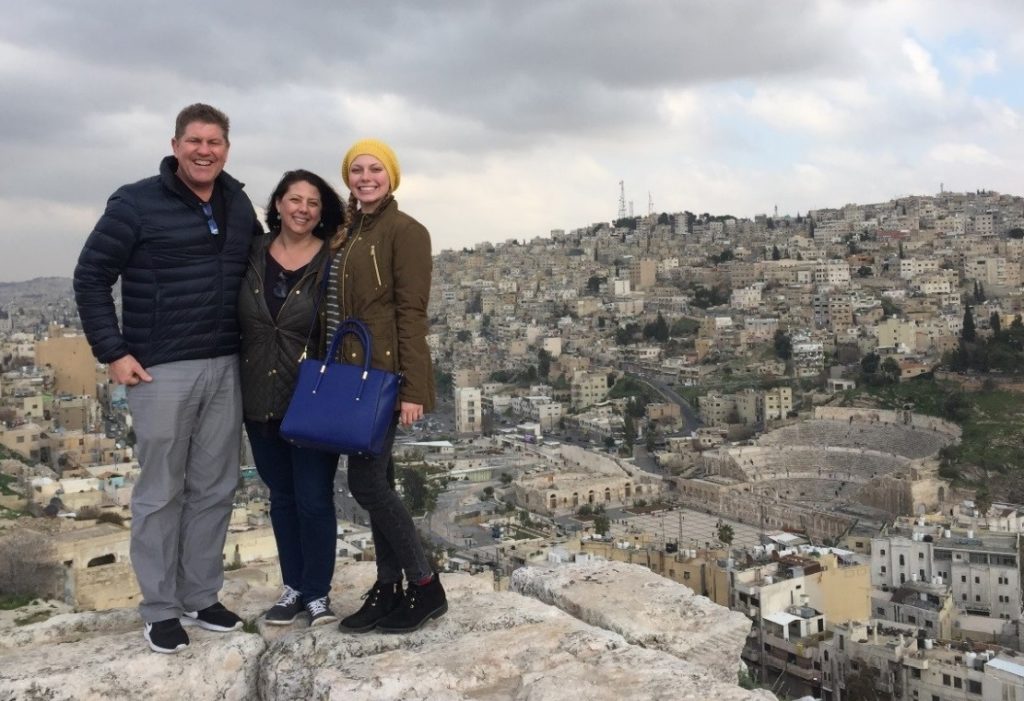
We were thoroughly amazed to hear her haggle with a taxi driver over the price of our ride; she learned a great deal of Arabic in a short period of time, which endeared her to most taxi drivers, even though she was trying to bargain them down.
We were fortunate enough to be able to visit our daughter in Amman half way through her semester and spend some time with her in be
tween classes. We met with Dr. Doug and Patti as well as the other students and were thoroughly impressed by the quality of the program and the caliber of both the instructors and the students. Because the program has such a good reputation, we felt confident sending our 19-year-old daughter to the Middle East. However, once we arrived in Amman, we were delighted to find her living in a safe, comfortable apartment complex in a quiet, family neighborhood. We stayed in a lovely hotel a ten-minute walk from the MESP center and felt perfectly safe walking through the neighborhood at night. Our daughter felt completely safe and at home at the center. We all found the Jordanian people warm, friendly and welcoming.
We highly recommend the MESP program in Amman. Our daughter learned more than we even hoped for and God used the experience to fuel her passion for and calling to the Muslim people. In addition, our eyes and hearts were opened in new ways to the Arab culture through our own experience as well as our daughter’s.
— Ron & Nicole Dunaetz, parents of a MESP Spring 2017 alumna
The Thomas'
– Drs. Mark & Sheila Thomas, parents of Fall 2021 alumnus Colin Thomas
PROGRAM LOCATION
You’ve heard a great deal about the Middle East, but the region is vast and ever-changing. Read the FAQ below to find out more about your location!
Where does the program take place?
You’ll also travel to neighboring countries in the Middle East to get a wider breadth of regional understanding. The travel itinerary changes each semester, but most MESP semesters have included a trip to Israel-Palestine and to one or two of the following countries: Egypt, Morocco, Tunisia, and Turkey.
What is the climate like?
Jordan has quite an arid climate, and typically gets very little precipitation. Of course, every climate has its exceptions. In January 2022, we had a snowstorm that dropped over a foot of snow in Amman! MESP shared some great pictures on social media of the cohort enjoying the winter wonderland.
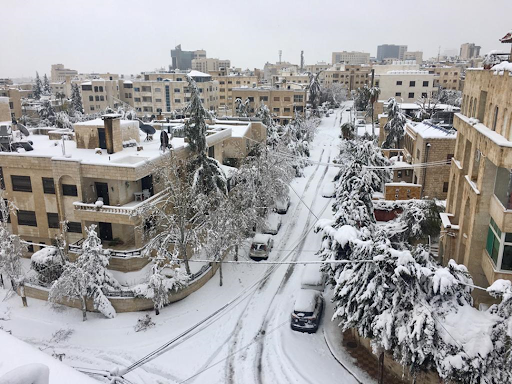
Will I get to travel throughout the semester?
In Jordan, you’ll spend most of your time in and around Amman, with trips to places like Jerash, Madaba, Mt. Nebo, Jesus’ baptism site, Wadi Rum, Aqaba, and Petra. Many of these are day trips, but a few take place during weekends, allowing you to spend more time exploring and experiencing the culture, history, and landscape.
Over the course of the semester, you’ll travel throughout the Middle East. You’ll spend 10 days in Israel-Palestine, hearing from people on all sides of the conflict and learning from those who are seeking peace in various ways. You’ll visit hallowed religious and historical sites, asking what it means to follow Jesus in the very places where he walked. And you’ll take another trip to 1-2 different countries in the Middle East/North Africa region — recent destinations have included Morocco, Tunisia, Egypt, and Turkey — to learn firsthand about the history, religion, politics, and culture of those areas.
COMMUNICATION
How can you get in touch with MESP classmates and new local friends? How will you stay up to date on what is happening back home? Communication and technology work a bit differently in Amman than in the United States. Read the FAQ below to find out more.
Will I be able to use a cell phone?
How can I best communicate back home?
Can I have visitors while I’m in the Middle East?
Should I bring a laptop or tablet with me?
Travel
What do you need to know before you step on that plane? Read the FAQ below to find out.
How will I get to and from the program?
Will I need a passport?
To apply for a (U.S) passport or renew your current passport, visit the U.S. Department of State’s website.
Will I need a visa?
If you are a citizen of a country other than the U.S. or Canada, you may need to apply for an entry visa prior to travel to Jordan or another country to which you will travel during MESP.
Please research what type of requirements apply to your situation, and reach out to globaled@cccu.org with any questions.
ACADEMICS
Academic learning has rarely been this adventurous. Whether in or out of the classroom, you’ll be learning through experience, immersion, and service. Read the FAQ below to find out more.
What do classes look like at MESP?
This model provides a powerful academic and emotional support structure; you and your classmates will experience everything alongside one another. When you’re drawing connections between what you just learned in “Conflict and Change in the Middle East” and a verse that was shared at devotions that morning, you’ll have a family of peers to share in that discovery.
Who will be teaching my classes?
How many credits will I receive, and what exactly will I be studying?
Introduction to Arabic Language (4 or 6 credits)
Islamic Thought and Practice (4 credits)
Conflict and Change in the Middle East (The Israeli-Palestinian Conflict) (4 credits)
Peoples and Cultures of the Middle East (4 credits)
Since MESP is independent of the schedules and facilities of a host university, the program is free to blaze its own academic curriculum: it can adapt to take advantage of current events and opportunities.
For detailed descriptions of MESP courses, visit the MESP Academics section.
Will there be opportunities to serve during my semester at MESP?
Can I study a language?
CULTURE
One of the most thrilling and challenging aspects of learning about Middle Eastern culture is actually participating in it. Read below for help in answering these questions.
Will I need to know the language?
Will I be interacting with local people? What are they like?
How does life in Amman compare to life in an American city?
But once you branch out from the familiar, you’ll discover singular coffee shops and restaurants where you’ll experience the true tastes of the Middle East: both the intense ‘Turkish’ and the lighter ‘Arab’ hospitality coffee, and the classic Middle Eastern shawarma, falafel, mansaf and kanafe. And, unlike in your average North American city, there won’t be a confusing public transportation system to learn. Taxis, which are affordable and readily available, will be your main means of transportation.
Amman is also culturally and religiously unique. The city is predominantly Muslim, so you’ll hear the muezzin sing the call to prayer from minarets across the city five times a day. The Jordanian culture combines Middle Eastern modesty and devout religious practice, which means you’ll see more women with headscarves and fewer men wearing shorts. You’ll bargain with shopkeepers to buy souvenirs; you’ll grow adept at learning how you’re expected to interact with the opposite sex; and you’ll begin to see your own Western culture in a very different way.
COMMUNITY AND DAILY LIFE
Read the FAQ below to find out more about everyday life in the Middle East!
Where will I live?
What will I eat?
In addition, MESP students and staff share several communal meals together each week. Merna, a Jordanian friend of MESP who has a catering business, cooks a variety of Jordanian, regional, and global dishes for our group. Students come to love ‘Merna meals’ and look forward to them each week. Plus, Merna meal leftovers are both delicious and helpful in stretching that food stipend!
What is MESP community life like?
In addition to our MESP cohort, you’ll have the opportunity to build community with Jordanians and others in Amman as you participate in city life in various ways and meet people through MESP-facilitated events and exploring on your own!
Will I have the opportunity to attend a local church?
Additionally, the MESP cohort will attend a few church services together during the semester, including a Coptic service conducted in Coptic and Arabic and worship with an international congregation in Arabic and English.
SAFETY
Some students and parents worry about whether it is safe to study in Amman and travel in the Middle East. Rest assured: safety is the number one priority of the Middle East Studies Program. See below for common questions about security.
Who monitors the safety of the students?
How does safety in the Middle East compare to safety elsewhere in the world?
The safety and security of our students is our number one priority. During orientation and travel briefings, we prepare students for how to act in culturally appropriate ways that contribute to overall safety. Our staff constantly monitors the news; checks in with the U.S. Embassy (10 min away), the U.S. State Department, and the local police department (just up the street); and regularly follows up with our network of local and international security advisors. For more information on safety, please see our Health & Safety page.
And, ultimately—as in any region or circumstance—the MESP team puts their trust in God, practicing a balance of wisdom, caution, and common sense. As followers of Jesus, we ask: Is this a time in history when God would have us to be present in the Middle East? We feel the resounding answer is, YES!



